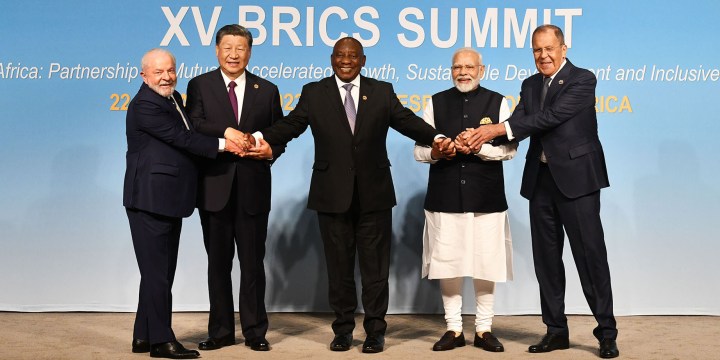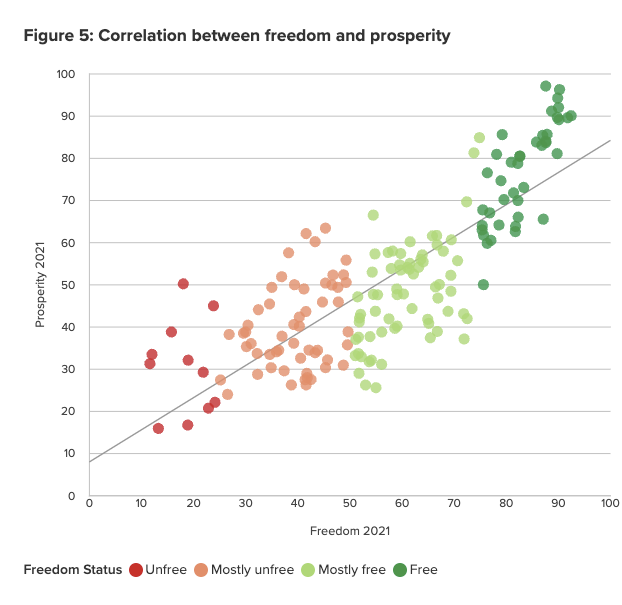BUSINESS REFLECTION
After the Bell: The BRICS bloc takes a dive on the freedom scale

South Africa is now part of an organisation that essentially does not even vaguely have democracy as its guiding light.
Finally, the BRICS grouping has announced that six more countries will join the group: Ethiopia, Egypt, Argentina, Iran, Saudi Arabia and the United Arab Emirates (UAE).
For me, the first and most important aspect of the countries chosen is that the group has become less democratic. By the Freedom House definition of democracy, which focuses in particular on political rights and civil liberties, the average freedom status of the old BRICS grouping was 52 out of 100, making the group generally free.
The new grouping heavily favours undemocratic countries, or at least countries that are less free. By the Freedom House definition, the group now scores, on average, 38/100, which would put it in the NGO’s “not-free” camp. In fact, the only new country they consider to be “free” is Argentina. Clearly, freedom was not an important criterion when deciding who should join.
There has been some criticism of Freedom House’s methodology; freedom is difficult to define if you really want to be nitpicking. But the alternative measure produced by Polity, if anything, makes it even more obvious that the group is becoming less free on average. The Polity score for the BRICS group was 4.6 out of 10. The enlarged group now scores less than zero!
There are other interesting aspects of the group: Why Ethiopia rather than Nigeria? Why so many countries from the Middle East? That, by the way, also means six of the nine biggest oil producers will be part of the group, so don’t expect a strong climate crisis lobby to emerge out of the group.
There is one noticeable upside: SA is no longer economically the smallest member; thank you Ethiopia. And now countries with comparatively small populations, like the UAE (population about 10 million), are part of the group. And that does mean that potential economic heft and a large population — the combination that loosely defined the original BRIC group — are no longer criteria.
But it’s the freedom aspect that is the biggest problem because SA is now part of an organisation that essentially does not even vaguely have democracy as its guiding light. Does this matter? Well, that depends on your opinion, and for what it’s worth, my opinion is that it does. A lot.
The question is not just one of taste. The Atlantic Council, a US international affairs NGO, which in 2021 got donations from the UAE, Goldman Sachs and the UK Foreign Office, among many others, has done thorough work on the correlation between freedom and prosperity. The plot is extraordinary. Not only are free countries wealthier, but the more free a country is, the more likely it is to be more wealthy.
Now, obviously, these correlations have been questioned for a range of reasons. Is it possible, for example, that as countries become wealthier, they also become more free? In other words, the correlation is not showing causation, it’s just showing outcome, which is not quite the same thing. Personally, I think this is just academic carping. Obviously, what happens is that countries that become more free will get richer, then they become even more free, and get richer still.
Of course, whenever you raise the correlation between freedom and prosperity, inevitably someone will throw China in your face. China, which has a Freedom House score of 9/100, and has managed to go from a GDP per capita of $1,000 in 1990 to $12,000 today, is the notional contraindicator.
But what people who cite the China objection forget, I suspect, is that China has in fact become massively freer over that period, at least from an economic point of view. Markets now run much of the economy of China even in places where dictatorial fiat once reigned supreme. China is not so much an exception to the rule, but rather a demonstration of it.
And you can see that even today. China’s recent economic problems (and don’t we in SA wish we had “problems” like growing by “only” 3% or so) are partly caused by government overreach such as forcing maximal lockdown restrictions in response to the Covid outbreak. In doing so, the Chinese government has undermined consumer confidence and rattled investors. It’s just all so “modern economy”.
The problem here is that politicians, generally speaking, are rational economic actors by default rather than by choice. It used to be said of the US that its government could be relied on to do the right thing after trying all available alternatives. In some ways, you could apply the same maxim to the whole world.
And that is why a group weighted towards doing the wrong thing is a concern. DM


















And yet no-one ever talks about the real reason for this organisation, from my point of view anyway, is power. The New World Order that Russia is pushing for. 1 government to control the world.
More and more the country of my birth, represents me less and less.